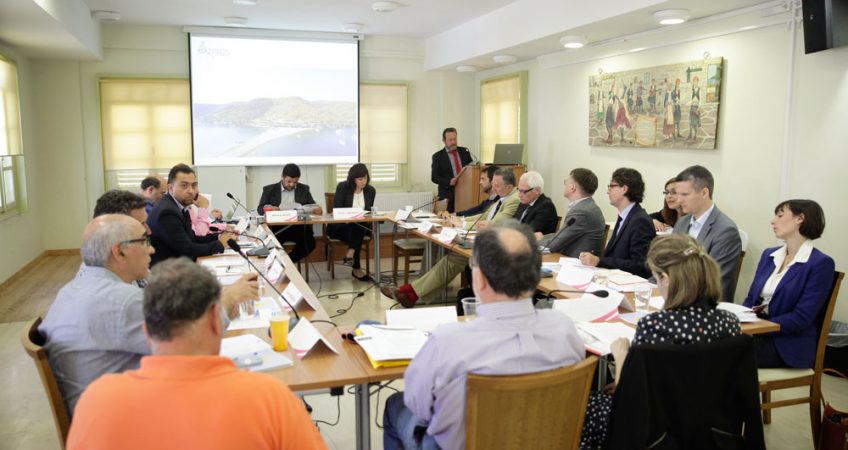On Tuesday 17 May a team of seven representatives of the European Economic and Social Committee (EESC) visited Kythnos in the framework of the Committees’ initiative “Smart Islands in Europe”. The visit was organized with the assistance of DAFNI Network of Sustainable Aegean and Ionian Islands and the Aegean Energy Agency.
Prior to Kythnos, EESC representatives visited five different islands across Europe in order to collect best practices in the fields of energy, water, waste and tourism flow management, to be used for the publication of a Guide. The Guide aims to highlight the comparative advantages of islands in implementing such practices and will be disseminated across all EU islands, European institutions and relevant organizations.
In Greece EESC chose to visit Kythnos, for the island exhibits a considerable track record of innovative pilot projects related to the production and management of sustainable energy (1stwind park in Europe, hybrid plant and micro-grid in Gaidouromandra area). Another reason is that the Municipality of Kythnos is currently putting significant effort in promoting a master plan for the island, which foresees different innovative projects for the integrated and sustainable management of local infrastructures, hence creating the proper conditions for the sustainable regeneration of the island.
By capitalizing on the important innovation Kythnos exhibits, the Municipality wants to underscore the island’s potential to emerge as a paradigm of integrated and smart management of the above key infrastructures, ensuring high quality of life for local citizens and visitors. A paradigm that could be replicated in other islands, geographically isolated (mountainous and rural) areas and scaled-up in urban areas, contributing to the transition to the smart city of the future. EESC’s visit offered an excellent opportunity for the promotion of the island in Greece and abroad, and provided insights on how to attract EU and national funding for the realization of infrastructure projects with significant relevance for the local economy.
Further, during the visit an open discussion was held at the Municipal Council premises involving the local authority, local stakeholders and citizens in order to exchange views on the experiences of the past and future prospects of the development of Kythnos. Present during EESC’s field trip were also representatives of PPC Renewables – particularly interested in reviving the RES plants the company owns on the island; HEDNO – the electric grid operator on the island, key player in the process of modernizing the grid in the future; and GIZ, closely collaborating with Germany’s Federal Ministry for Economic Affairs and Energy, with a view to broadening the scope of support offered to Kythnos, building on collaboration between Greece and Germany around similar projects for more than 35 years now. Following the introduction and morning presentations, visitors were taken on a tour around the island to take a close a look at the pilot applications and experience the unique natural and cultural environment of the island.
Kythnos Smart Island – Master Plan
The master plan will assess the current situation of the energy, waste and water infrastructures and how these relate to the island’s economic activities (tourism, primary and secondary sector activities) and foresees prefeasibility studies of the different potential projects to support the Smart Islands concept. The main element of the master plan is the development of the Smart Kythnos Centre which could include a Renewable Energy Sources Exhibition, demonstrating the history and future of sustainable energy in Kythnos and the rest of the Aegean, and a Smart Training Lab where international and domestic summer schools can take place yearlong with trainees from all education levels, from primary schools to master students. The Smart Kythnos Centre may support the broadening of the tourism period in Kythnos with the subsequent benefits for the island’s economy. The Centre could potentially be hosted at PPC’s old power plant or in other municipal buildings. A study to turn the building into a Nearly Zero Emissions Building, according to the latest EU directives, will be also carried out in the frame of the master plan.
The realisation of the master plan is strongly supported by the Municipality of Kythnos, the local stakeholders and entrepreneurs but also the organisations having taken part in shaping the island’s sustainable energy profile.
Briefly the projects to be planned, promoted and realised in the framework of the Master Plan are presented in the following non-exhaustive list:
- Smart electrical system: New hybrid station with a combination of Wind Turbines, PVs and batteries. Upgrade of the existing microgrid in Gaidouromandra and investigation of potential replication in new locations.
- Smart water management: Installation of a PVs and a small wind turbine possibly coupled with battery storage to cover part of the desalination plants’ electricity demand. Optimization of the upper reservoir’s size storing the desalinated water in order to provide additional energy storing capabilities. Partial replacement of old water pipelines combined with the installation of smart water sensors and a tele-management system to reduce the current significant water losses and inefficient management and monitoring of the water network.
- Smart waste management: Reduction of the produced waste; optimization of waste collection plan and maximisation of local reused waste by-products (biogas, fertilizers, water for reuse and others) aiming to the strengthening of the local circular economy. The aim is for Kythnos to become a zero-waste island managing locally the largest amount of produced waste.
- Smart transportation and mobility: Installation of at least 5 EV charging stations (one at each main settlement) and procurement of EVs by the Municipality and other stakeholders while in parallel promoting the higher penetration of electricity produced by RES plants.
- Smart street lighting: Upgrading the energy efficiency of the street lighting network through the replacement of existing luminaires with high efficiency LED technology ones along with the use of smart control systems.


